|
|
|
Sort Order |
|
|
|
Items / Page
|
|
|
|
|
|
|
| Srl | Item |
| 1 |
ID:
140683
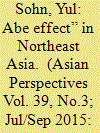

|
|
|
|
|
| Summary/Abstract |
IN DECEMBER 2012 ABE SHINZO RETURNED TO POWER AFTER FIVE years in the political wilderness. Since taking office he has solidified his political leadership by winning all successive elections, paving the way to becoming one of the longest tenured premiers in postwar Japan. His security and foreign policies have already changed the landscape of international relations in East Asia as Tokyo’s relations with Seoul and Beijing spiraled down to new lows for the post–Cold War era. Abe’s new security policy, under the slogan “Proactive Contribution to Peace,” helped bring the Japan-US alliance to an unprecedented level of closeness, clearly pitted against China. The Abe government is also potentially challenging the China-centered new economic order by promoting the US-led Trans-Pacific Partnership (TPP) trade network. Abe’s decision to enter the TPP talks became a game changer in the race for free trade agreements in Asia and the Pacific.
|
|
|
|
|
|
|
|
|
|
|
|
|
|
|
|
| 2 |
ID:
129969
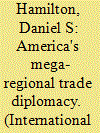

|
|
|
|
|
| Publication |
2014.
|
| Summary/Abstract |
The United States is currently negotiating two massive regional economic agreements, one with 11 Asian and Pacific Rim countries and the other with the 28-member European Union. The Trans-Pacific Partnership (TPP) and the Transatlantic Trade and Investment Partnership (TTIP) herald a substantial shift in US foreign economic policy as Washington turns its focus from the stalemated Doha Round of multilateral trade negotiations and scattered bilateral trade agreements to 'mega-regional' trade diplomacy. As the only party to both negotiations, Washington seeks to leverage issues in one to advance its interests in the other, while reinvigorating US global leadership.
|
|
|
|
|
|
|
|
|
|
|
|
|
|
|
|
| 3 |
ID:
147639


|
|
|
|
|
| Summary/Abstract |
As part of its economic diplomacy, Australia has directed intense effort into both bilateral and plurilateral trade negotiations such as the Trans-Pacific Partnership. According to then Minister for Trade and Investment Andrew Robb, with no major multilateral trade deal in decades, you have to ‘row your own boat’ or risk missing out. With the fundamentals of trade and the nature of trade negotiations changing, trade liberalisation has become an increasingly sophisticated and difficult negotiating area. A case study of the controversial TPP shows the tensions for a middle power navigating this space. The benefits of the TPP are contested and the government faces criticism of the adverse impacts of the agreement, especially investor-state dispute settlement clauses, impact on human rights and suspicion that the TPP is motivated by geopolitical drivers. In order not to lose more than it gains in moving away from the multilateral trade system, Australia must ensure that trade agreements are consistent with WTO rules and have open and fair accession regimes as a basis for signing. Finally, there is the need for higher levels of transparency and democratic accountability than has historically applied. A new white paper is necessary to make the case for trade liberalisation.
|
|
|
|
|
|
|
|
|
|
|
|
|
|
|
|
| 4 |
ID:
152500


|
|
|
|
|
| Summary/Abstract |
Trade adjustment assistance (TAA) is government aid to those affected by trade agreements. We review the history of TAA in Canada and ask whether Canada needs to reintroduce it in response to the recent intensification of trade negotiations. In light of the compensation offered by the federal government in connection with the Canada–European Union Comprehensive Economic and Trade Agreement (CETA), we examine how TAA fits in with the evolution of Canadian federalism in the trade policy area. Based in part on interviews with provincial trade negotiators, we conclude, first, that the compensation is an outcome of Canadian federalism. Second, we argue that while there is no reason to reintroduce a federal TAA program for workers, compensation for provinces is necessary to facilitate their cooperation with the implementation of trade treaty provisions. Third, we suggest that a more transparent rationale for such compensation would be superior to the ad hoc compensation observed in CETA.
|
|
|
|
|
|
|
|
|
|
|
|
|
|
|
|
| 5 |
ID:
145614


|
|
|
|
|
| Summary/Abstract |
Thaksin Shinawatra, the former prime minister of Thailand, is one of the world’s most polarizing figures, whose words still reverberate across Southeast Asia. His tenure at the helm of the Thai government in the early 2000s marked a growing rift between Thailand’s urban middle class and the rural and working class who adore him. After more than two years of public silence and a decade after his ouster, the former prime minister spoke with World Policy Journal in New York City.
|
|
|
|
|
|
|
|
|
|
|
|
|
|
|
|
| 6 |
ID:
173182


|
|
|
|
|
| Summary/Abstract |
This article examines Japan’s trade policy on significant geo-economic developments by focusing on its engagement in three large free trade agreements: the Trans-Pacific Partnership, the Regional Comprehensive Economic Partnership, and the Japan–EU Economic Partnership Agreement. Under the Abe administration, Japan has produced successful outcomes in mega-FTA strategy, concluding the Comprehensive and Progressive Agreement for Trans-Pacific Partnership and the Japan–EU Economic Partnership Agreement in 2018. The making and diffusion of high-standard rules were given high priority in Japan’s mega-FTA strategy, and Prime Minister Abe’s political leadership in employing his political allies and executive aides and managing the opposition activities of veto players has enabled his administration to produce these successful outcomes.
|
|
|
|
|
|
|
|
|
|
|
|
|
|
|
|
| 7 |
ID:
149056
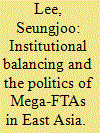

|
|
|
|
|
| Summary/Abstract |
The dynamics of institutional balancing is the predominant factor prompting East Asian countries to move to mega-FTAs. Rather than seeking mega-FTAs purely on the basis of economic benefits, these countries, particularly major powers, have attempted to form mega-FTAs to counter the target state’s vision of the regional architecture.
|
|
|
|
|
|
|
|
|
|
|
|
|
|
|
|
| 8 |
ID:
152246
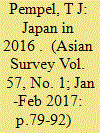

|
|
|
|
|
| Summary/Abstract |
Japanese domestic politics, foreign policy, economics and society continued along well-established paths in the year 2016. And long-term demographic trends remained a major unresolved challenge. Yet three exceptions to continuity stood out: first, controversial legislation that expanded the legality of collective self-defense; second, the likely collapse of the Trans-Pacific Partnership (TPP); and third, the election of Donald Trump.
|
|
|
|
|
|
|
|
|
|
|
|
|
|
|
|
| 9 |
ID:
160006
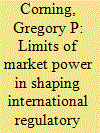

|
|
|
|
|
| Summary/Abstract |
What factors shape the ability of the United States to negotiate international regulatory cooperation? This paper discusses three theoretical approaches that help to explain the potential for regulatory change – market power, historical institutionalism, and loss avoidance – and applies them to the negotiation of regulatory issues in the Trans-Pacific Partnership (TPP). It seeks to understand why the regulatory disciplines in some TPP chapters were more rigorous than those in other chapters. Focusing on case-studies of the chapters on state-owned enterprises and regulatory coherence, the paper argues that the market power of the United States is more likely to secure stronger regulatory disciplines when there is: (1) a strong loss avoidance coalition in the USA pushing for change, and (2) a weakly institutionalized regulatory framework among parties in a given issue area that makes path dependence less important.
|
|
|
|
|
|
|
|
|
|
|
|
|
|
|
|
| 10 |
ID:
149055
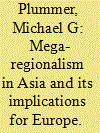

|
|
|
|
|
| Summary/Abstract |
The rise of mega-regionalism in the Asia-Pacific has become a significant development for the region itself as well as the global trading system. Europe, in particular, has a great deal at stake in this process. This paper considers the economic costs of EU exclusion from Asia-Pacific economic cooperation initiatives.
|
|
|
|
|
|
|
|
|
|
|
|
|
|
|
|
| 11 |
ID:
143256
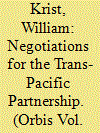

|
|
|
|
|
| Summary/Abstract |
The Trans-Pacific Partnership, a free trade agreement under negotiation among the U.S. and 11 other countries, would have an enormous impact on world trade and would advance U.S. foreign policy interests. However, several modifications are needed if this agreement is to be a good template. Negotiators should ensure that the rules which are designed to promote international investment do not weaken regulators’ ability to promote the public welfare. It is crucial that the rules on intellectual property protection do not result in more costly pharmaceuticals. And most importantly, negotiators need to address currency manipulation.
|
|
|
|
|
|
|
|
|
|
|
|
|
|
|
|
| 12 |
ID:
146300


|
|
|
|
|
| Summary/Abstract |
ON FEBRUARY 4, 2016, in Auckland, heads of 12 Pacific Rim states signed a treaty on the Trans-Pacific Partnership (TPP), the first trans-regional mega-partnership, which will come into force in the next two years as soon as at least six countries, representing about 85% of the total GDP of the TPP, have ratified it.
|
|
|
|
|
|
|
|
|
|
|
|
|
|
|
|
| 13 |
ID:
144947
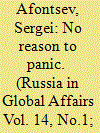

|
|
|
|
|
| Summary/Abstract |
The formation of the Trans-Pacific Partnership (TPP) has a good chance to become a turning point in the development of regional economic cooperation. Now that the first wave of both enthusiastic and angry comments on the TPP agreement has subsided, it is time to ask the main question: What is its novelty for the world economy and politics?
|
|
|
|
|
|
|
|
|
|
|
|
|
|
|
|
| 14 |
ID:
158173
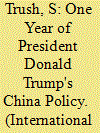

|
|
|
|
|
| Summary/Abstract |
CHINA became a defining topic of Donald Trump's election campaign, since it was closely associated with the basic elements of both his foreign and domestic policy. Whether directly or indirectly, China affected globalization, its pluses and minuses for America, U.S. jobs and industry, the conditions of American business's competition on both the domestic and foreign markets, the ensuring of free trade, the revival of depressed industrial regions, the leaking of technological and strategic secrets, key elements of military strategy, and the United States' role in the world and geoeconomics.
|
|
|
|
|
|
|
|
|
|
|
|
|
|
|
|
| 15 |
ID:
149054
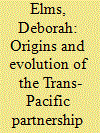

|
|
|
|
|
| Summary/Abstract |
The text of the Trans-Pacific Partnership agreement and more than 5,000 pages of individual country schedules were released in October 2015 after five years of negotiations. Its transformation from a small agreement to one of the deepest and broadest trade deals ever, with 12 members, highlights the challenges of negotiating modern comprehensive trade agreements.
|
|
|
|
|
|
|
|
|
|
|
|
|
|
|
|
| 16 |
ID:
152000
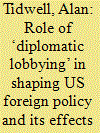

|
|
|
|
|
| Summary/Abstract |
Lobbying as a form of engagement with the US Congress has long been studied from a domestic perspective. Lobbying, however, is not a practice confined to actors with domestic interests—it is also used as a form of diplomacy by many foreign governments, including Australia. Diplomatic lobbying is a vastly understudied phenomenon and its impact on US foreign relations is rarely examined. Unlike most Westminster-based democracies, the USA has two branches directly involved with foreign affairs—the Executive and Congress—each of which is important for different aspects of foreign policy development. Australia has found lobbying the US Congress to be a powerful tool for diplomatic engagement. This article looks at the role of the US Congress in foreign affairs, the effects of lobbying, and the ways in which diplomats engage with and lobby Congress. Australia’s specific lobbying efforts and their effects on the US–Australia relationship are then examined.
|
|
|
|
|
|
|
|
|
|
|
|
|
|
|
|
| 17 |
ID:
156437
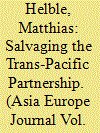

|
|
|
|
|
| Summary/Abstract |
The high hopes that the Trans-Pacific Partnership (TPP) would open up trade across the Pacific were dashed by the decision of the new US Government under President Trump to withdraw from the agreement in January 2017. Despite being controversial, the TPP had been recognized as an agreement that substantially updates and extends international trade rules responding to new technological developments and economic realities. It was thus lauded by some as the first true twenty-first century trade agreement. The United States’ withdrawal from TPP gives the agreement an uncertain future. Yet, we argue in this paper that some achievements of the TPP might not be lost. The TPP offers important lessons for other ambitious regional trade deals both in terms of process and content. Furthermore, several chapters of the TPP can become blueprints for ongoing and upcoming negotiations at the multilateral level. A one-to-one transposition of TPP provisions into the multilateral trade agreement is unlikely, yet certain provisions could serve as valuable inspiration for future multilateral trade talks.
|
|
|
|
|
|
|
|
|
|
|
|
|
|
|
|
| 18 |
ID:
171885
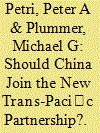

|
|
|
|
|
| Summary/Abstract |
After President Donald Trump’s ill-advised pullout from the Trans-Pacic Partnership (TPP) and despite the absence of the US, the remaining 11 Asian and Pacic countries agreed on a deal, renamed the Comprehensive and Progressive Agreement for Trans-Pacic Partnership (CPTPP). The accord took effect on 30 December 2018 and provides rigorous, up-to-date rules for Asia−Pacic trade, but excludes the region’s two biggest economies: the US and China. In this paper, we calculate that Chinese membership in the CPTPP would yield large economic and political benefits to China and other members. The CPTPP, in its current form, would generate global income gains estimated at US$147bn annually. If China were to join, these gains would quadruple to US$632bn, or a quarter more than in the original TPP with the US. But to join the CPTPP, China would have to undertake unprecedented reforms and manage complex political challenges
|
|
|
|
|
|
|
|
|
|
|
|
|
|
|
|
| 19 |
ID:
141699
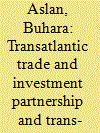

|
|
|
|
|
| Summary/Abstract |
As a result of deadlocked multilateral trade negotiations, many countries have embarked on the establishment of bilateral and regional trade agreements. Using the Global Trade Analysis Project database and a computable general equilibrium model, our paper focuses on the impacts of the Transatlantic Trade and Investment Partnership (TTIP) and the Trans-Pacific Partnership (TPP) on the Chinese economy under three scenarios. The results suggest that when only the TTIP is realized, Chinese economic variables are negatively affected. When both the TTIP and the TPP are realized and China is excluded, the combined damage to the Chinese economy is higher than the damage with the TTIP alone. However, the inclusion of China in the TPP has a positively effect on economic variables in China. This indicates that the impacts of China's participation in the TPP compensate for the negative impacts of the TTIP. Therefore, China should consider being part of the TPP to offset the negative impacts of the TTIP.
|
|
|
|
|
|
|
|
|
|
|
|
|
|
|
|
| 20 |
ID:
148689
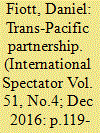

|
|
|
|
|
| Summary/Abstract |
The Trans-Pacific Partnership, if ratified by all parties, is likely to have ramifications for the global defence market and the US’ economic and political strategy towards the Asia-Pacific region. Although the TPP excludes a number of defence-related issues such as defence procurement, the TPP’s provisions on technology transfers and intellectual property rights could bolster the US’ military-technology relations with the Asia-Pacific. For Europe, which is excluded from the Partnership, the likely impact of TPP is uncertain and could raise important challenges and opportunities related to Europe’s own defence-industrial relations with the Asia-Pacific and its wider security role in the region.
|
|
|
|
|
|
|
|
|
|
|
|
|
|
|
|
|
|
|
|
|